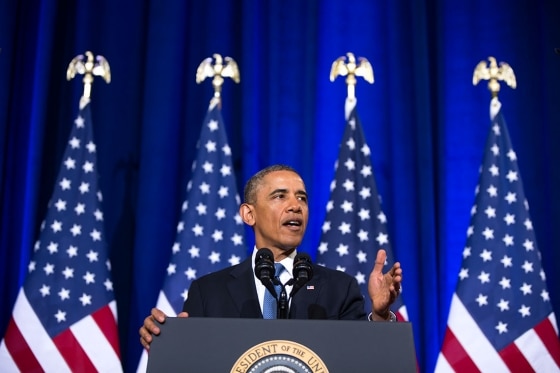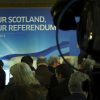
In terms of foreign policy, Barack Obama is giving the Americans what they want deep in their hearts. Opinion polls, like the recently published survey by The Wall Street Journal, show a citizenship eager for the country withdrawing to a certain extent from the world. Nearly half want a US that is less active on the world stage and only one-fifth hold the opposite view. Yet public acceptance of Obama’s foreign policy is at its lowest level, with only 38% approval (just as his overall image has improved). Perhaps Robert Kagan is right to guess that Americans want what Obama has given them but they are neither proud nor grateful for it.
This has led to lengthy editorials on the subject in English language periodicals, such as The New York Times and The Economist. Generally, they focus not only on content but also on form, on what they describe as Obama’s ‘pusillanimity’, doubts and musings. In Obama’s foreign policy it is not only his –despite all appearances– cold and calculating personality that counts, but also the fact that by virtue of his policy the US is withdrawing from two wars that had become extremely unpopular –Iraq and Afghanistan– and that the world has become much more multipolar. Obama is the first President of the age of multipolarity, unlike his predecessors. George W. Bush was the President of unipolarity –although this was merely an illusion, as the world was undergoing a deep change–; Bill Clinton of globalisation and George H.W. Bush –whose approach had a greater similarity to Obama’s– of change.
In today’s world, the US remains the leading power in all respects, although in some magnitudes of GDP it might be overtaken this year by China. But it is equalled by no country in the commercial, financial, cultural and, of course, military capacities. It remains second to none. Nevertheless, its ability to shape its environment has declined. Obama is aware of this. In the face of the Arab Spring, and despite his declarations, he only played a limited role. Yet he wanted his Secretary of State, John Kerry, to make a further attempt to mediate between Israelis and Palestinians.
He is now being judged by the way he is responding to the occupation of the Crimea and Russia’s destabilisation of the Ukraine. But at the end of his recent tour of Asian countries he voiced an idea that has been much discussed, when he considered, ‘Why is it that everybody is so eager to use military force after we’ve just gone through a decade of war at enormous cost for our troops and to our budget’. And he added ‘and what is it exactly that these critics think would have been accomplished?’. However, those actually advocating greater military action are few. Among the Republicans, Senator John McCain, but not others such as the possible presidential candidate Ron Paul.
Obama has to cope with a very complex moment without losing his composure. The Nobel Peace Prize which he was awarded at the beginning of his mandate was premature. But he has acted wisely, and has not been soft, as he showed with Libya, even ‘leading from behind’. He has become addicted to the use of drones in scenarios such as Pakistan, Afghanistan and Somalia.
Perhaps his Presidency’s greatest achievement has been to avoid an economic crisis –preventing a recession from becoming a depression– and to have managed to promote, with the Federal Reserve, a recovery that is also imperative for Europe. But it is a recovery that many citizens are not yet feeling, especially those who have dropped out of the unemployment roll in sheer desperation, or those who have seen their wages cut. And that is why many of those who reject foreign action are the same as those that see themselves as the losers in an open economy in a globalised world. And their wish is that the domestic front gets priority treatment, which is why the polls show that support for globalisation is falling among lower-income and lower-education groups. In turn, this casts a shadow over the future of the Transatlantic Partnership for Trade and Investment (TTIP) that, if successfully concluded, can become one of the biggest successes of the Obama Administration’s foreign policy. But the President, after some initial enthusiasm, has disappointed Europe, and not only on this account: he has also failed to shut down the detention (without trial) centre at Guantanamo and been harmed by the National Security Agency (NSA) spying on European leaders.
Contrary to the neocons, Obama does not look at the world through ideological lenses. He has taken risks with Iran and might reach an agreement in July to stop the latter’s race to possess a nuclear weapon, which would be a great success. While negotiating he has also prevented Congress from imposing new sanctions on Tehran.
He has steered clear of grand strategies. He is a pragmatist at the head of the world’s greatest superpower, which frequently generates suspicion and earns his criticism for either doing to too much or too little, although the US is actually less powerful in this much more complex world. In relation to Russia, which he tried to approach in the earlier part of his term in office, he is acting cautiously as there can be no military response from the US or the West, except to reassure those of their allies who feel threatened. And while a competitor, he is quite ably managing relations with China, the only rival the US has for the foreseeable future. The New York Times concluded its editorial by assessing that Obama’s foreign policy ‘is not as bad as his critics say. It’s just not good enough’. But the playing field is big enough for him to play yet.
In terms of foreign policy, Barack Obama is giving the Americans what they want deep in their hearts.


